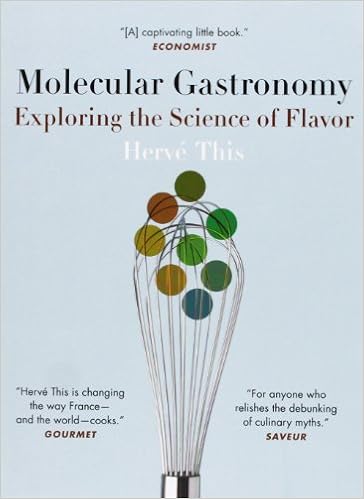
For the casual or unprofessional reader a title like Molucular Gastronomy has the allure of eating a bowl of stewed prunes. It sounds like a drudge, but physical chemist author Hervé This on the staff of the Institut National de la Recherche Agronomique in Paris, applies science to questions of food, cooking and eating and keeps it fascinating. He applies science to questions of why does a tannic wine taste awful when paired with a salad tossed with an acidic dressing, does beef marinade better in a white or red wine, and the best ways to soften lentils. He breaks his book up into four parts. Part one covers kitchen issues and he dissects many old saws of cooking either explaining why the actually work or showing why they don’t. Part two looks at flavor and how it works. In part three he applies science to issues such as bread baking, lumps in food, foams, Spanish Hams and foie gras. Part 4 addresses how the scince of gastronomy will impact the cuisine of tomorrow. He breaks the book up into digestible little bits – the 361 page book contains 101 subparts and subtracting out the introductions, the subparts run a page or two. Here and there they get a little technical but the majority are accessible to nontechnical reader while still of interest to the technical. Anyone interested in food, cooking or eating should find this book a fun read
Hervé This (pronounced "Teess") is an internationally renowned chemist, a popular French television personality, a bestselling cookbook author, a longtime collaborator with the famed French chef Pierre Gagnaire, and the only person to hold a doctorate in molecular gastronomy, a cutting-edge field he pioneered. Bringing the instruments and experimental techniques of the laboratory into the kitchen, This uses recent research in the chemistry, physics, and biology of food to challenge traditional ideas about cooking and eating. What he discovers will entertain, instruct, and intrigue cooks, gourmets, and scientists alike.
Molecular Gastronomy, This's first work to appear in English, is filled with practical tips, provocative suggestions, and penetrating insights. This begins by reexamining and debunking a variety of time-honored rules and dictums about cooking and presents new and improved ways of preparing a variety of dishes from quiches and quenelles to steak and hard-boiled eggs. He goes on to discuss the physiology of flavor and explores how the brain perceives tastes, how chewing affects food, and how the tongue reacts to various stimuli. Examining the molecular properties of bread, ham, foie gras, and champagne, the book analyzes what happens as they are baked, cured, cooked, and chilled.
Looking to the future, Hervé This imagines new cooking methods and proposes novel dishes. A chocolate mousse without eggs? A flourless chocolate cake baked in the microwave? Molecular Gastronomy explains how to make them. This also shows us how to cook perfect French fries, why a soufflé rises and falls, how long to cool champagne, when to season a steak, the right way to cook pasta, how the shape of a wine glass affects the taste of wine, why chocolate turns white, and how salt modifies tastes.
No comments:
Post a Comment